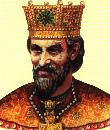
In a late autumn night of 864 Boris and his closest associates were baptized in the palace in Pliska. Bulgaria was to become a Christian state. Heaving ascended the throne in 852 as Pressian's successor, Boris I did not hesitate in forcing his people to give up pagan rites and adopt Christianity. He went so far as to order the execution of fifty-two nobles who had remained Faithful to their pagandom.
Boris I was not an outstanding military commander. Bulgaria often suffered defeat at the hands of its powerful enemies Byzantium, the German kingdom, Croatia and Serbia, but the state's borders remained unchanged. Boris I was a skillful diplomat who knew the power of kind words and allies. He not only sought alliance with Prince Rostislav of Moravia and the Frankish King Charles the Bald, but he also extended a hand to his recent enemies: the German King Ludwig and the Byzantine Emperor Michail III.
Bulgaria's conversion to Christianity was prompted mostly by external events. Another unsuccessful war with Byzantium in the autumn of 863 compelled Boris to enter a peace treaty under which Bulgaria was to regain the region of Zagora with the exception of the strongholds on the Black Sea, but was bound to dissolve its alliance with the German kingdom and, most important of all, to adopt Christianity.
Boris already believed that in his age culture went hand in hand with Christianity. Not the bloody sword and aggression but the new faith could make Bulgaria the cultured European states' equal. That was the road to culture to spiritual enlightment, he thought. Historical evidence shows that Boris became familiar with the work of Cyril and Methodius, the inventors of the Slavic alphabet, as early as 881-882. On his way to Constantinople Methodius and his disciples met with the Bulgarian ruler. "The great Methodius often bestowed the blessing of his words on the Bulgarian prince Boris... whom he had made his disciple," reads a preserved document.
Bent on introducing Slavonic liturgy and determined to foster the development of Slavonic letters, Boris was eager to have people like Cyril and Methodius and their followers come to Bulgaria. He welcomed their disciples and their Christian mission. With Boris's help, two disciples of Cyril and Methodius, Clement and Naum, set up two educational centers, in Pliska and in Kutmichevitsa (Macedonia).
After Bulgaria's conversion to Christianity, the Slavonic language was firmly established as the vehicle of cultural development. The Glagolitic alphabet brought by the disciples of Cyril and Metodius, came to be referred to as Cyrillic alphabet. The alphabet allowed for the development and enrichment of the Old Bulgarian (or Old Church Slavonic) language which was then adopted by other Slavic peoples and made Bulgaria the first center of Slavonic letters and culture.
Prince Boris I was an ardent champion of the independence of the newly-founded Bulgarian Church. Both Roman Catholicism and Byzantine Orthodox Christianity were eager to have Bulgaria under their influence. Boris sought a middle ground between the Patriarch of Constantinople and Pope Nicolas I. He sent a special delegation to the Pope with a list of 115 questions and was sent in response the famous 106 answers about the essence of religion, law, politics, customs and personal faith. Both Byzantine priests and Catholic bishops travelled the country, baptizing and blessing the people. Boris I harvested the fruits of his wisdom and patience 870 when the Bulgarian Church was given autonomy from the Byzantine Church.
In 819 the elderly rules abdicated and retired to monastic life, but he kept a hand in the affairs of the state. He stepped in against his own son Vladimir who succeeded him to the throne and who in 893 attempted to reestablish paganism. Vladimir was deposed and replaced by Boris's other son Simeon who was to continue his father's work. Boris could now pass away in peace. Constantine of Preslav later wrote about him: "It is not with his bodily eyes that he wished to see, but with the eyes of the soul, so that he could gain insight into the true essence of things..."

 My name is Radostina Georgieva, "Roddy".
My name is Radostina Georgieva, "Roddy".